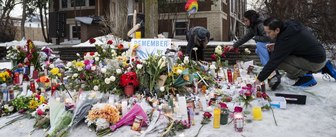Face masks are one of the ways Americans can protect themselves and others from contracting COVID-19. But many people aren’t happy about wearing masks for long periods of time, with two to three hours — the length of a concert, a movie, or less than half of a school day — the typical amount of time Americans say they can be comfortable wearing a mask continuously, according to the latest Economist/YouGov Poll. Not surprisingly, people who are most likely to wear a mask are also more likely to tolerate wearing one for longer periods of time.
Wearing face masks has become a political act, like many kinds of behavior related to COVID. Democrats are far more likely to say they always wear a face mask outside their homes: 55% of Democrats say they always wear a mask, while just 21% of Republicans do. Three in ten Republicans say they never wear a mask, compared with 5% of Democrats. Half of the people who always wear masks outside their homes say they can wear a mask comfortably for more than three hours at a time.
Other measures meant to limit the spread of COVID also divide opinion by political party. While 84% of Democrats favor mask mandates for K-12 students, only 27% of Republicans do them. And 86% of Democrats report being fully vaccinated, compared with 58% of Republicans.
While politics is tied to vaccine acceptance, there are other factors that correspond to divides at least as great on vaccination. One is age: 80% of Americans ages 65 and older say they are fully vaccinated; barely half of people between ages 18 and 29 are. Another factor is education. About eight in ten of Americans with college degrees report that they are fully vaccinated, but only 48% of Americans with a high school degree or less as their highest attained educational level say the same. That is a 31-point gap. The age and education differences exist within each party as well.
The party gap persists in whether health or economic concerns about the pandemic predominate. A majority of Americans are more concerned about the health effects of the pandemic than about its economic effects – a priority that has persisted since earlier stages of the outbreak. This week, 57% are more concerned about the health effects of the pandemic, with 43% more concerned about its economic effects. That continues to be the case even though more than half of Americans today believe the economy is getting worse – the highest percentage saying this since spring 2020, when the pandemic was in its first devastating surge.
More Republicans, however, prioritize economic-related pandemic concerns than do health-related concerns, as they have throughout most of the pandemic. Except during April 2020 — during the first pandemic surge when the unemployment rate jumped into double digits — Republicans consistently have worried more about what the pandemic is doing to the U.S economy than how it is affecting American health.
Americans who worry more about the pandemic’s impact on the economy are wearing masks much less than those who are more concerned about the impact on health. About one in three (36%) say they wear masks most of the time or always, less than half the share (74%) of Americans who worry more about the pandemic’s impact on health who wear masks most of the time or always.
See the toplines and crosstabs from this Economist/YouGov Poll
Methodology: The Economist survey was conducted by YouGov using a nationally representative sample of 1,500 U.S. adult citizens interviewed online between October 24 - 26, 2021. This sample was weighted according to gender, age, race, and education based on the 2018 American Community Survey, conducted by the U.S. Census Bureau, as well as 2016 and 2020 Presidential votes (or non-votes). Respondents were selected from YouGov’s opt-in panel to be representative of all U.S. citizens. The margin of error is approximately 3% for the overall sample.
Image: Getty









